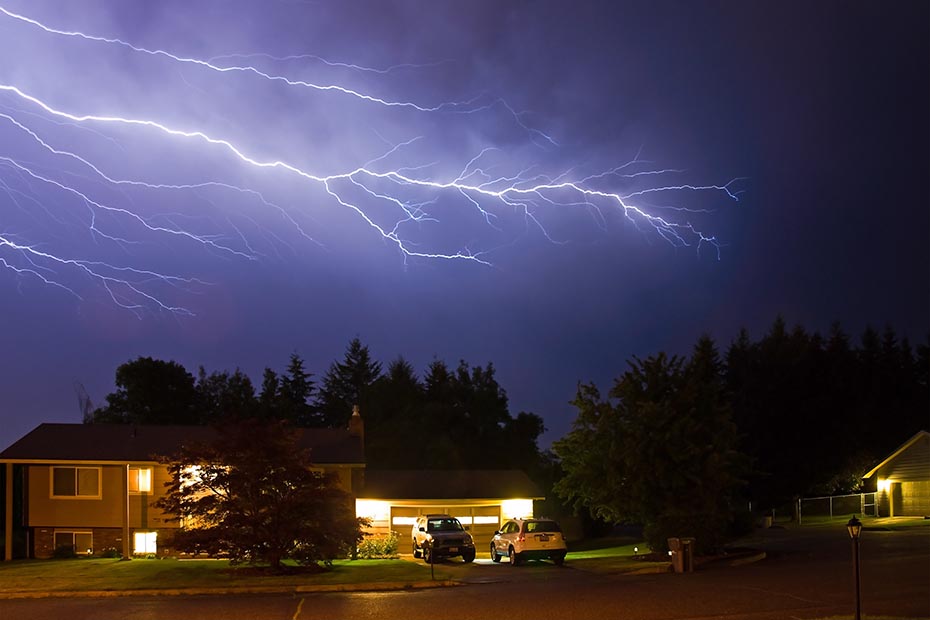Property Damage: Beware of Property Storm Chasers

Important Notice: Some clients are experiencing issues receiving emails from us. Our team is working quickly to resolve the problems. We apologize for any inconvenience and appreciate your patience.

By Aviva Canada • Published April 13, 2023 • 3 Min Read
A summer’s day can one minute be hot and sunny and with a blink of an eye, a storm can roll up with 45mph winds ripping through neighbourhoods or golf ball size hail, pounding down onto homes and vehicles causing physical damage to property.
Severe weather brings storm chasers and scammers who try to make an extra buck off your damaged property.
Storm chasers and scammers pose as legitimate property damage contractors, who often give false promises to repair property damage. Roof repair scams are an easy target when storms rip through neighbourhoods. It’s as easy as having a property contractor knock on your door, with a shingle in their hand, stating that they are doing work in the neighbourhood and noticed shingles missing off your roof.
Be aware and don’t be an easy target and fall for their claims!
Here are some RED FLAGS to be aware of when identifying property repair scammers:
Exaggerating Damages – the dishonest property repair contractor will magnify the damages and lie to homeowners stating that the roof has an abundance of missing shingles. They will also often scare homeowners by stating that repairs need to be done ASAP or further damages, like water seeping into their homes, will occur on their property.
Contingent Agreements And Contracts – some cheating property repair contractors will promise the world to homeowners by advising they will be able to repair or replace full roofs. They will go as far as embellishing the truth to get homeowners to trust them into thinking they can help negotiate insurance claims. The contractor will provide a smooth-talking representative to persuade homeowners to sign documents and pressure them into using their business to repair the damage.
Upfront Payments – some corrupt property repair contractors will demand upfront cash payments and once the homeowner pays, the contractor disappears without finishing, or even starting the home repair.
Special Deals – some property repair scammers will offer deals or provide lower quotes. Cheaper doesn’t always mean better — remember the saying, “you get what you pay for.” Some contractors will low ball the property repair quote to get the job and once the work is done, homeowners are stuck with poor repairs and substandard materials.
Contact your insurance company. Your insurance company will be able to send a qualified contractor to assess damages and provide a reliable quote to have your property repaired.
Do your research — research the contractor and business online and ask for references.
Do not sign any documents until you have read the entire document thoroughly, including the fine print.
Check how long the contractor has been in business for and confirm their warranty.
Obtain more than one repair estimate.
Work with property repair contractors who are licensed and insured.
Get a free online quote* for coverage to protect you, your property, and your belongings from the unexpected.
*Home and auto insurance products are distributed by RBC Insurance Agency Ltd. and underwritten by Aviva General Insurance Company. In Quebec, RBC Insurance Agency Ltd. Is registered as a damage insurance agency. As a result of government-run auto insurance plans, auto insurance is not available through RBC Insurance in Manitoba, Saskatchewan and British Columbia.
This article is intended as general information only and is not to be relied upon as constituting legal, financial or other professional advice. A professional advisor should be consulted regarding your specific situation. Information presented is believed to be factual and up-to-date but we do not guarantee its accuracy and it should not be regarded as a complete analysis of the subjects discussed. All expressions of opinion reflect the judgment of the authors as of the date of publication and are subject to change. No endorsement of any third parties or their advice, opinions, information, products or services is expressly given or implied by Royal Bank of Canada or any of its affiliates.
Share This Article
Read This Next

Whatever You Need, We Can Help
Speak with an RBC Insurance Advisor: 1-888-925-0946 or Have an Advisor Call Me
Want to meet? Find an Advisor or Store